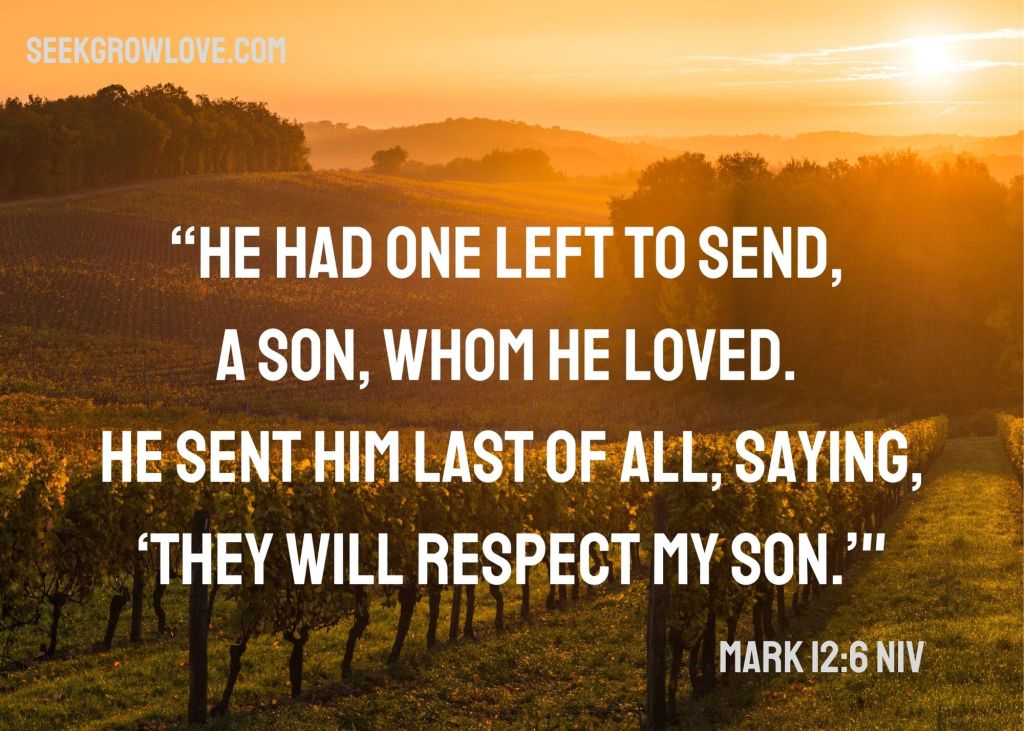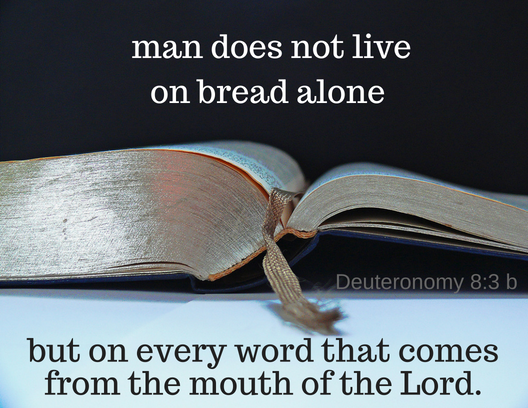
Mark 12
Wednesday, August 3, 2022
Jesus, over and over again in Mark chapter 12, both evades the entrapment of those who wish him harm and enlightens his followers concurrently. In this chapter, men of simultaneous hypocrisy and high standing as well as the Sadducees attempted to either ask Jesus a question to bait him into testifying against the law of Moses or deny his Christhood. He first tells a story of a vineyard and its owner, then corrects hypocrites in their mentality on taxes, and catches the Sadducees in their deliberately poor interpretation of the word.
I highly suggest that, before reading further, you go read Chapter 12:1-12 for yourself because it caught me off guard! But anyway, the chapter begins with Jesus laying out a parable of a man who purchased a vineyard and put effort into making it a fruitful investment. He put a wall around it, bought a winepress, and even built a watchtower for its protection. Having invested this much of himself into it, he went on a rightful journey as he rented it out to some tenants. However, in their stupor, the tenants got greedy and refused to pay the vineyard owner what was due. The owner sent man after man to collect the money, all of which were returned either beaten or dead (not good). After the man had sent all his servants to collect the money, he was left with only his son. He hoped that, since it was his only son whom he loved dearly, they would finally respect him. But rather, they saw this as an opportunity to take the owner’s inheritance for themselves, and they killed the son too! Jesus then says, “What then will the owner of the vineyard do? He will come and kill those tenants and give the vineyard to others. Haven’t you read this scripture: ‘The stone the builders rejected has become the capstone; the Lord has done this, and it is marvelous in our eyes.’”
The chief priests, teachers, and elders who had questioned Jesus’ authority wanted so badly to persecute Jesus for telling this story, because it was clear that Jesus was talking about them. You see, the owner of the vineyard represents God, who built a beautiful place for the tenants, us humans, to live. He put effort into creating this world, and when He sent his only and beloved son to talk to us, man killed the son of God. But it does not end there. The scripture that he quoted stands as a retribution for the murder of Jesus. ‘The stone the builders rejected has become the capstone, the Lord has done this, and it is marvelous in our eyes.’ For those who don’t know, the capstone is the stone to surmount all other stones in a wall or pillar. That is, God took the stone that man rejected and elevated him to a position above the rest, and it is marvelous.
This also acts as a warning to us. Although that part is not as fun to think about, to ignore it would be doing injustice to the passage as a whole. The owner of the vineyard is to come and kill the tenants, because they killed his son. God has every right to put those who desecrate His son in their place. When Jesus comes to you with an answer or a question, do you push him away or do you welcome him?
In this passage, the son coming to the tenants is a final gift from the owner of the vineyard, that he may still have mercy on them after all that they had done. And yet, they squander this gift by killing him. Are you squandering the gift that God so graciously gave you; this life on earth blessed by salvation through the blood of Christ? We must not be overcome with greed and selfishness of the pleasures of this world that are only here because God put them here in the first place. If gratitude can be seen as a parent of all virtues, (by this meaning that we can’t truly express any other virtue without first being gracious for the current state in which we preside), then we need to be gracious for what God gave us. We are blessed to have this time on earth that we may spread the word and increase the Kingdom of God, as is our mission.
-Mason Kiel
Application Questions
- What do we learn about Jesus from this parable?
- Do you accept that God has sent His beloved Son for you? How do you receive him?
- What does it mean to you that, “The stone the builders rejected has become the cornerstone (or capstone); the Lord has done this, and it is marvelous in our eyes”? (Mark 12:10&11 – quoted from Psalm 118). Do you give Jesus the place of capstone/cornerstone in your life now? What does/would that look like?






 Looking to Jesus, how can we be ready to do battle with temptation? First, he knew the word of God. It is how He responds not only to the temptation, but even when the word of God is seemingly being used against Him. How can you know the will of God? It is as ironically simple as losing weight: diet and exercise. Consume the right thing, His word, and practice it daily, so you will be spiritual healthy. Next, do God’s business. Know that temptation can come at any moment, but comes easier when we are idle (Prov 16:27-29). Keep your eyes on God and your hands and feet busy to his work. Like the old adage, “if you’re going through hell, just keep going,” Jesus faced the temptation, but immediately moves onto His ministry. Temptation IS NOT sin. No guilt required; pick up and move on. Finally, be on guard. Relapse can setback or even kill your spiritual life. Removing unnecessary temptation from our lives is a must. Even if we are in the word every day, engaging in spiritual disciplines, or deeply involved in a ministry, at the very height of our endeavors, it only takes a moment to go back to sin and fall harder and faster than we ever did (the very nature of relapse). If you can’t hang out with your friends without getting drunk, then don’t hang out with them. If you can’t be on the internet without looking at inappropriate sites, then don’t get on it. If you can’t use social media without bridling your tongue and speaking in love, then stop. Jesus uses hyperbole to illustrate the practical advice when he states, “it is better to cut your hand off” or “pluck your eye out” (Matt 5:29, 30) than to be lost to sin, and ultimately the kingdom of God.
Looking to Jesus, how can we be ready to do battle with temptation? First, he knew the word of God. It is how He responds not only to the temptation, but even when the word of God is seemingly being used against Him. How can you know the will of God? It is as ironically simple as losing weight: diet and exercise. Consume the right thing, His word, and practice it daily, so you will be spiritual healthy. Next, do God’s business. Know that temptation can come at any moment, but comes easier when we are idle (Prov 16:27-29). Keep your eyes on God and your hands and feet busy to his work. Like the old adage, “if you’re going through hell, just keep going,” Jesus faced the temptation, but immediately moves onto His ministry. Temptation IS NOT sin. No guilt required; pick up and move on. Finally, be on guard. Relapse can setback or even kill your spiritual life. Removing unnecessary temptation from our lives is a must. Even if we are in the word every day, engaging in spiritual disciplines, or deeply involved in a ministry, at the very height of our endeavors, it only takes a moment to go back to sin and fall harder and faster than we ever did (the very nature of relapse). If you can’t hang out with your friends without getting drunk, then don’t hang out with them. If you can’t be on the internet without looking at inappropriate sites, then don’t get on it. If you can’t use social media without bridling your tongue and speaking in love, then stop. Jesus uses hyperbole to illustrate the practical advice when he states, “it is better to cut your hand off” or “pluck your eye out” (Matt 5:29, 30) than to be lost to sin, and ultimately the kingdom of God.